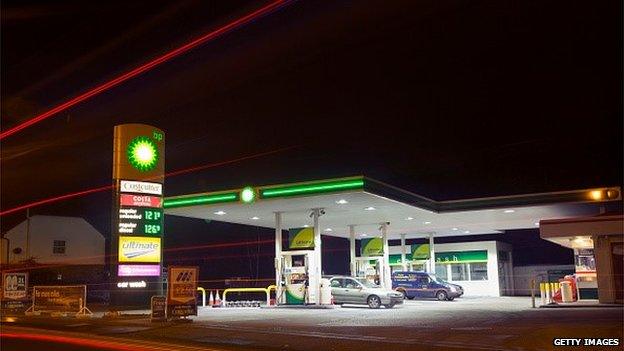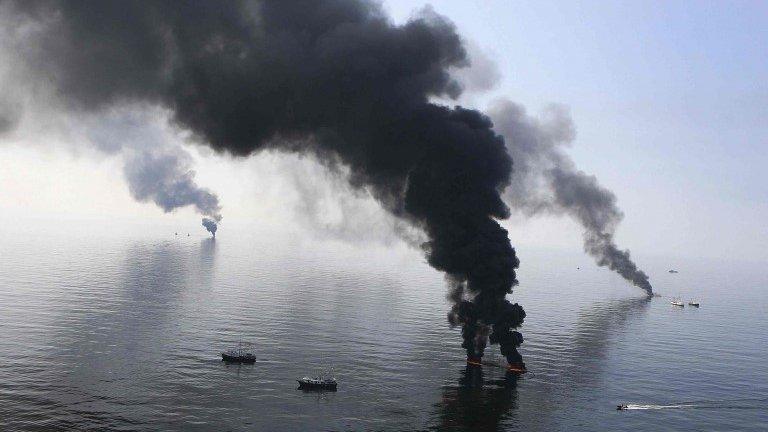BP profits fall on low oil price
- Published

BP has reported a sharp fall in profits for the three months to the end of June as lower oil prices continue to hurt.
Underlying replacement cost profit (RCP) was $1.31bn (£841m) compared with $3.63bn a year ago.
However, after setting aside $7.5bn for further costs relating to the 2010 Deepwater Horizon oil spill disaster, BP recorded a loss of $6.26bn.
On 2 July, BP reached an $18.7bn settlement with the US Department of Justice (DoJ) over the oil spill.
BP said, external that in all, it was setting aside $9.8bn in the quarter for costs related to settlements with the DoJ and 400 local governments in relation to the oil spill, which became one of the worst environmental disasters in US history and claimed the lives of 11 people.
The results come at a time of continuing uncertainty for oil companies, with oil prices more than 50% lower than last year.
Brent crude oil stood at $52.93 a barrel on Tuesday, compared with roughly $115 a year ago.
The lower oil price is not only hurting the profits of the major oil firms, but also means they have cut back on investment in exploration in areas where they consider it makes little economic sense to drill.
BP chief executive Bob Dudley said: "The external environment remains challenging, but BP moved quickly in response and we continue to do so.
"Our work to increase efficiency and reduce costs is embedding sustainable benefits throughout the group and we continue with capital discipline and divestments."
Downstream delight
In the last three months, Brent crude has averaged $62 per barrel, compared with $54 a barrel in the first quarter and an average of $110 a barrel the in the same period a year ago. In the third quarter to date, the price has averaged $58 a barrel.
Mr Dudley added: "In the past few weeks, oil prices have fallen back in response to continued oversupply and market weakness and the recent agreements regarding Iran. I am confident that positioning BP for a period of weaker prices is the right course to take, and will serve the company well for the future."
Oil and gas companies' businesses are predominately made up of "upstream" activities - getting energy out of the ground - and "downstream" - refining it into useable products.

Analysis: Douglas Fraser, BBC Scotland business and economy editor
Eleven lives lost and the huge oil spill in the Gulf of Mexico five years ago have so far cost BP $54.6bn (£35bn).
And the London-based oil giant admits that it still can't say it has capped this dollar gusher, or how much it will be in the end.
Without that, it's still making big profits, but it's a very different industry from last year. The oil price fall looks longer-term, and has returned to the downside in recent weeks.
BP is not alone in reporting a sharp drop in earnings, relying on its downstream refining to prop up the upstream problems. Later this week, Royal Dutch Shell reports on its half-year figures.
Statoil of Norway on Monday reported a fall in second-quarter profits from 32.3bn kroner (£2.5bn) to 22.4bn kroner (£1.75bn), beating market expectations. Production has gone up, following investment and lower maintenance requirements this year, and the company has been hammering down on costs, including job losses.
Like BP, it is sharply cutting investment spend. Companies in offshore exploration and production don't see the return they need at current oil prices.
Wood Mackenzie, the energy analyst, reckons $200bn (£128bn) of oil industry investment has been postponed this year, with the lion's share of that in offshore, and another chunk in Canada's tar sands. That keeps 20 billion barrels of oil (and gas equivalent) in the ground and under the seabed, at least until prices rise.

And as in the the previous quarter, BP found little to shout about from its exploration activities. Its "upstream" business reported an underlying pre-tax replacement cost profit (RCP) of $0.5bn in the three months to June, compared with $0.6bn three months earlier and $4.7bn for the same period a year earlier.
RCP is a measure of profitability used by the oil industry that takes into account the price of oil.
BP set the blame squarely on lower oil and gas prices.
It said the results also included about $600m of exploration write-offs and other costs related to BP's activities in war-torn Libya.
That meant once again that BP's profits came from its refinery or "downstream" business.
There, it reported underlying pre-tax RCP of $1.9bn, compared with $2.2bn in the first quarter and $0.7bn in the same period year ago.
BP also said it would maintain its dividend at 10 cents per ordinary share. That may help to calm investors after the company missed analysts' estimates that it would make $1.6bn in the quarter.
- Published2 July 2015
